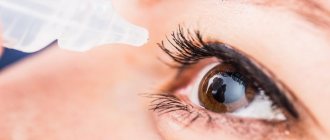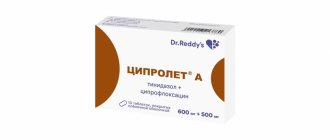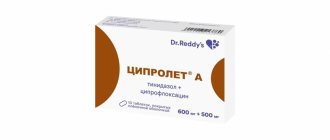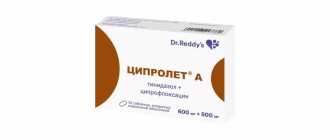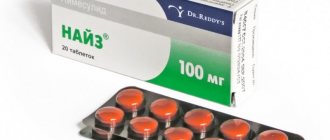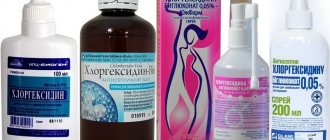Characteristics of Tsifran
Cifran is an antibiotic of the fluoroquinol group. It is used for infectious diseases that are accompanied by a strong inflammatory process. The effectiveness of treatment is based on the fact that the drug interferes with the activity of pathogenic microorganisms and does not allow them to multiply. The main component of Cifran is active against gram-positive and gram-negative bacteria that are insensitive to the action of cephalosporins, aminoglycosides and penicillin.
Cifran is an antibiotic that is used for infectious diseases accompanied by severe inflammation.
Indications for the use of the drug are as follows:
- diseases of bones and joints: osteomyelitis, septic arthritis, sepsis;
- eye infections: corneal ulcers, blepharitis, conjunctivitis, etc.;
- gynecological pathologies: endometritis, inflammatory processes in the pelvis;
- skin diseases: infected burn wounds, ulcers, abscesses;
- ENT diseases: inflammation of the middle ear, sinusitis, sinusitis, pharyngitis, tonsillitis;
- diseases of the urinary system: pyelitis, chlamydia, gonorrhea, prostatitis, pyelonephritis, kidney stones;
- pathologies of the digestive system: shigellosis, campylobacteriosis, salmonellosis, peritonitis.
In addition, Cifran is prescribed for preventive purposes after eye surgery.
Antibiotics are contraindicated in the following cases:
- intolerance to the components of the drug;
- pregnancy;
- lactation;
- children under 18 years of age.
It is prescribed with caution to elderly people, for diseases of the kidneys, liver, mental disorders, epilepsy, atherosclerosis of blood vessels, and cerebrovascular accidents.
After a course of treatment, side effects rarely occur. These include:
- from the digestive tract: hepatitis, loss of appetite, cholestatic jaundice, bloating, nausea, epigastric pain, flatulence, diarrhea, vomiting;
- from the nervous system: dizziness, insomnia, tremors of the limbs, depression, hallucinations, migraine, fainting, increased sweating;
- from the senses: diplopia, impaired taste buds, hearing impairment;
- from the genitourinary system: interstitial nephritis, hematuria, crystalluria, glomerulonephritis, kidney anomalies, dysuria, polyuria.
Forms of release of Tsifran: eye drops, solution for infusion, tablets. Manufacturer of the drug: Ranbaxy Laboratories Ltd., India.
Analogues of Tsifran include: Zoxon, Zindolin, Tsifran ST, Tsiprolet.
Remdesivir
Remdesivir is used to treat Ebola fever. Canadian scientists from the University of Alberta have found that the drug blocks the reproduction of coronavirus. Studies have proven the effectiveness of the antiviral agent in the treatment of MERS respiratory syndrome and SARS-CoV, the RNA structure of which is similar to coronavirus. Virologists obtained identical results in the case of SARS-CoV-2, which causes COVID-19, and concluded that remdesivir could be used for treatment. The New England Journal of Medicine also published the results of a study in which the use of the drug improved the condition of 68% of patients. Japanese Prime Minister Shinzo Abe said in parliament on April 28 that he plans to authorize the use of remdesevir to treat COVID-19. In the United States, the drug was successfully tested, and on May 2, the Department of Sanitary Inspection issued an emergency permit for its use.
Characteristics of Tsiprolet
Tsiprolet is an antibiotic belonging to the group of fluoroquinolones. Having penetrated the bacterial cell, its active substance does not allow the formation of enzymes involved in the reproduction of infectious agents. Doctors often prescribe this drug for the treatment of many diseases.
Tsiprolet is an antibiotic that doctors often prescribe for the treatment of many diseases.
Tsiprolet effectively destroys:
- E. coli;
- streptococci;
- staphylococci.
The drug is indicated in the following cases:
- bronchitis, focal pneumonia;
- urinary system infections: kidney inflammation, cystitis;
- gynecological diseases;
- abscesses, mastitis, carbuncles, phlegmons, boils, accompanied by suppuration of various parts of the body;
- prostate disease;
- infectious processes in the ear, nose and throat area;
- peritonitis, abscess;
- hydronephrosis;
- infectious diseases of bones and joints;
- eye diseases.
In addition, Tsiprolet is prescribed after surgery for pancreatitis and cholecystitis in order to prevent purulent complications.
Contraindications for the drug include:
- deficiency of glucose-6-phosphate dehydrogenase;
- pregnancy, lactation;
- pseudomembranous colitis;
- children under 18 years of age;
- liver diseases.
Tsiprolet should be used with caution in patients with mental disorders, seizures, poor cerebral circulation, atherosclerotic lesions of cerebral vessels, and diabetes mellitus.
It is extremely rare for an antibiotic to cause side effects. It could be:
- anemia;
- increased seizure activity;
- irritation of the gastrointestinal tract;
- allergic reactions in the form of angioedema, rash, anaphylactic shock;
- heart rhythm disturbance.
Tsiprolet is produced in the form of tablets, solution for infusion, and eye drops. Manufacturer of the drug: Dr. Reddys Laboratories Ltd, India.
Its analogues include:
- Ciprofloxacin.
- Cipropharm.
- Tsipromed.
- Ciproxol.
- Ciloxane.
- Phloximed.
Comparison of Tsifran and Tsiprolet
Although the drugs have almost the same effect, they have differences, albeit insignificant.
Similarities
These drugs are available in the same forms: tablets, injection solutions, eye drops. Cifran and Tsiprolet are drugs from the same series and they have an identical active ingredient - ciprofloxacin. They have similar indications for use and have the same effect on pathogenic microorganisms. These antibiotics are also similar in terms of effectiveness and contraindications.
Tsifran and Tsiprolet are available in the same forms: tablets, injection solutions, eye drops.
What is the difference
Tsifran and Tsiprolet differ only in the additional components in their composition. The first product in the product line has a drug that has a prolonged effect (Tsifran OD). This drug completely destroys all pathogenic bacteria in the respiratory and genitourinary systems.
Which is cheaper?
Tsifran is a cheaper drug. Its average price is 45 rubles. The cost of Tsiprolet is 100 rubles.
Patient reviews
Marina, 35 years old, Moscow: “After the removal of a wisdom tooth, the soft tissues swelled.
This was accompanied by severe pain. The doctor prescribed Tsifran, which I took 2 times a day, 1 tablet. The swelling decreased on the third day, and completely disappeared on the seventh.” Yana, 19 years old, Vologda: “I recently got sick with a sore throat. I gargled with a soda-salt solution, which relieved swelling, but the effect was short-lived. After some time, the discomfort in the throat returned. The doctor recommended Tsiprolet. The swelling decreased the very next day, breathing became easier, and other symptoms also alleviated. After 2 days the swelling was completely gone.”
Ivermectin
Australian scientists from Monash University and the Royal Melbourne Hospital have discovered an antiparasitic agent that virtually destroys the SARS-CoV-2 virus within 48 hours, reducing its presence by 99%. According to researchers, the use of ivermectin will help avoid severe complications of COVID-19, as well as prevent the spread of the virus. During the experiments, ivermectin was added to cells infected with SARS-CoV-2. After 24 hours, the proportion of viral RNAs decreased by 93%, and after 48 hours, the presence of the virus decreased by 99%.
A single treatment with ivermectin can reduce the virus by 5 thousand times in 48 hours, scientists say. The drug is approved by WHO.
Reviews from doctors about Tsifran and Tsiprolet
Alexey, dentist: “I prescribe Tsiprolet to patients who have inflammatory processes in the tooth (chronic periodontitis). The medicine has few contraindications and side effects, and practically does not cause allergic reactions.”
Dmitry, infectious disease specialist: “In my practice, I often prescribe Tsiprolet for bacterial eye diseases, since this drug has a wide spectrum of bactericidal effects. It rarely causes allergic reactions."
Oksana, dermatovenerologist: “I often prescribe the antibiotic Tsifran in my practice for the treatment of venereological and dermatological diseases. It effectively destroys many microorganisms and has a minimum of contraindications.”
Nelfinavir
Nelfinavir is used in combination with other antiviral drugs to treat HIV. The study was carried out by Japanese scientists. According to the data obtained, the drug is able to block the reproduction of SARS-CoV-2. Virologists studied nine similar drugs and found that nelfinavir is effective even in small doses. Therefore, it is recommended to include it in the list of potentially effective drugs for the treatment of COVID-19.
What to do while there is no vaccine
- wear medical masks when visiting public places;
- on the street and in crowded places, maintain a distance of at least 1.5 m from others;
- avoid contact with people who have been exposed to the virus;
- stay at home if possible;
- wash your hands thoroughly with soap;
- use a disinfectant with an alcohol content of at least 60%;
- do not touch your face;
- monitor hygiene in the house.

